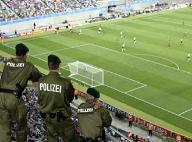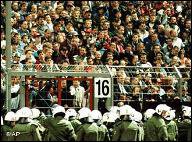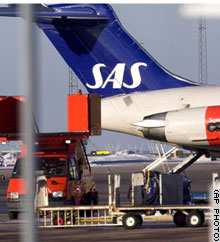Private Security Firms Gear Up for Soccer World CupSecurity is set to be one of the most important topics during the upcoming soccer World Cup in Germany and private security firms are rubbing their hands in anticipation.
Politicians and sports authorities in Germany are at pains to ensure that the soccer World Cup in Germany in June takes place in a cheerful, relaxed and carefree atmosphere.

Recent demands by German Interior Minister Wolfgang Schäuble to deploy the German army to provide additional security during the World Cup haven't gone down well with some.
"Tanks in the vicinity of stadiums: That would certainly be unacceptable," Theo Zwanziger, the president of the German Soccer Association (DFB), recently said in an interview. "We want people to hug each other. If tanks are stationed in the background -- even as a preventive measure -- it just wouldn't work."
Even as uncertainty surrounds the deployment of the German army during the World Cup, one thing's clear: Germany's police forces will be overstretched because organizers are expecting more than seven million visitors to descend on the country for the mega event.
This is where private security firms are expected to step in. Harald Olschok, head of the Federal Association of German Security Firms (BDWS), said the industry is gearing up for the event.
"It's a huge stroke of luck for the industry," Olschok said, adding that it also posed an unprecedented challenge. "For a relatively short period of six weeks there's going to be a huge demand: around 12,000 security personnel will have to be deployed. We're not going to manage that with our regular forces."
Boosting existing security ranksPrivate security firms will play a big role particularly when it comes to providing security for the 32 team quarters and in the downtown areas in 12 German cities where the games will take place. In addition, they'll also take over security for live game broadcasts on huge public screens across Germany.
"The games will be broadcast on huge screens in at least 200 cities," Olschok said.
The so-called "public viewing zones" are considered particularly sensitive areas from a security point of view. On the Strasse des 17. Juni -- one of Berlin's main boulevards -- alone authorities expect more than 100,000 fans to turn up for the screenings.
Security firms that regularly work for the German league or Bundesliga soccer games will largely secure the downtown areas of the cities where the World Cup games will take place.
One of them, the Hamburg-based company Power, is expecting it to be quite a challenge. "Around 350 to 400 security personnel are usually required for a Bundesliga game and 450 for a normal international game," said Carsten Klauer, the company's CEO. "But that number will probably be doubled during a single World Cup game."
Boosting its security staff is also one of the prime concerns of the company Leipziger Löwen that will provide security in the Saxon city of Leipzig. It plans to increase its current force of 160 to 1,500 temporarily.
"We've worked towards that purpose together with a local labor agency that's set up an extra World Cup office," said Ramon Rodriguez, in charge of World Cup matters at the company, adding that he's still looking for more people.
In theory anyone between the ages of 18 and 40 can apply, provided they don't have any prior convictions. However they do have to undergo a security check by federal police.
Robots to counter logistical nightmareMost security experts don't foresee any major hiccups during the event.
"In light of the stringent measures such as only letting in persons in the stadiums whose names are already known, we assume that we'll have almost perfect security in the stadiums," Olschok said.
Hooligans will find it tough getting access and if riots did take place, the police would be standing prepared in the background. The private security personnel will however not be armed.
"We have the authority to expel someone, if necessary with force, from the stadium," Klauer said.
Despite all the elaborate preventive measures, there's no ruling out the unexpected.
"When it comes to Bundesliga games, we know the routine very well," he added. "But it's going to be very different at the World Cup. Lots of VIPs, for instance, will be flown directly to the games by helicopter."

In addition, the World Cup Organizing Committee has made it mandatory that all stadiums be secured around the clock during the World Cup -- a requirement that involves a huge technical and logistical challenge.
Klauer's company thus plans to install a robot, both inside
and outside the stadium in Hamburg.
Special training to top it allAnother aspect of the mammoth process involves special training for all security personnel -- as required by the World Cup Organization Committee.
Germany's railway operator, Deutsche Bahn (DB), is responsible for the training.
"Our subsidiary, DB-Training, will train all the 12,000 participants," said Uwe Herz, a DB spokesman. "This is also about things like 'how do I appear confident and friendly' and the like."
There's speculation that DB got the training contract because it's the most important sponsor of the World Cup. What makes things worse is that the DB can't find enough trainers from its regular pool and has to hire external trainers from private security firms for the job.
No hefty profits expectedDespite the seemingly massive dimensions of the whole affair, the World Cup is not expected to bring in hefty profits for the security industry.
"We're making a huge effort here," Klauer said. "We have permanent employees here who from morning to evening do nothing else but prepare for the World Cup. But we're definitely not going to be overpaid for that."
"He's outfitted with special cameras that react to motion and he can feed live pictures to the central monitor," Klauer said.
Deutsche Welle 03/2006
 The robbers crashed through a gate at the airport and held up luggage handlers as they were unloading crates of foreign currency from the plane. No one was injured.
The robbers crashed through a gate at the airport and held up luggage handlers as they were unloading crates of foreign currency from the plane. No one was injured.


